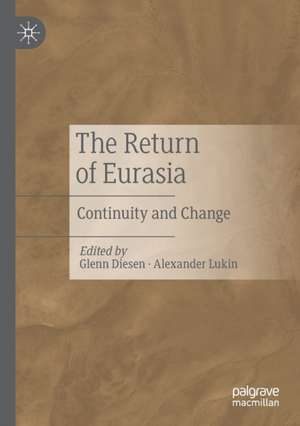The Return of Eurasia: Continuity and Change
Editat de Glenn Diesen, Alexander Lukinen Limba Engleză Paperback – 26 iul 2022
| Toate formatele și edițiile | Preț | Express |
|---|---|---|
| Paperback (1) | 781.82 lei 6-8 săpt. | |
| Springer Nature Singapore – 26 iul 2022 | 781.82 lei 6-8 săpt. | |
| Hardback (1) | 785.55 lei 6-8 săpt. | |
| Springer Nature Singapore – 25 iul 2021 | 785.55 lei 6-8 săpt. |
Preț: 781.82 lei
Preț vechi: 953.44 lei
-18% Nou
Puncte Express: 1173
Preț estimativ în valută:
149.62€ • 155.63$ • 123.52£
149.62€ • 155.63$ • 123.52£
Carte tipărită la comandă
Livrare economică 15-29 aprilie
Preluare comenzi: 021 569.72.76
Specificații
ISBN-13: 9789811621819
ISBN-10: 9811621810
Ilustrații: XVII, 313 p. 1 illus.
Dimensiuni: 148 x 210 mm
Greutate: 0.44 kg
Ediția:1st ed. 2021
Editura: Springer Nature Singapore
Colecția Palgrave Macmillan
Locul publicării:Singapore, Singapore
ISBN-10: 9811621810
Ilustrații: XVII, 313 p. 1 illus.
Dimensiuni: 148 x 210 mm
Greutate: 0.44 kg
Ediția:1st ed. 2021
Editura: Springer Nature Singapore
Colecția Palgrave Macmillan
Locul publicării:Singapore, Singapore
Cuprins
Sad Delusions: From Greater Europe to Greater Eurasia.- Greater Eurasia: From Geopolitical Pole to International Society?.- Asia before Eurasianism: The Pre-Revolutionary Roots of a Russian Emigré Ideology.- Greater Eurasia as a Conservative Initiative.- Central Asia in Eurasia: Its Role in History.- China’s Eurasian Ideas and the Silk Road Projects.- Turkey’s Return to Eurasianism: Is it real or just a pragmatic discourse?.- Hungarian Turanism: Eurasianism à la hongroise?.- Finding compatibility between Eurasian Partnership and Indo-Pacific security: an Indian perspective.- Is Southeast Asia ‘Eurasian’?.- The United States and Eurasia in Historical Perspective.
Notă biografică
Glenn Diesen is Professor at the University of South-Eastern Norway (USN). His research focus is Russia’s Greater Eurasia Initiative as a geoeconomic and conservative concept. Diesen’s latest books are EU and NATO relations with Russia: After the collapse of the Soviet Union (2015); Russia’s Geoeconomic Strategy for a Greater Eurasia (2017); The Decay of Western Civilisation and Resurgence of Russia: Between Gemeinschaft and Gesellschaft (2018); Russia in a Changing World (2020); Russian Conservatism: Managing Change under Permanent Revolution (2021); and Great Power Politics in the Fourth Industrial Revolution: The Geoeconomics of Technological Sovereignty (2021).
Alexander Lukin is Head of Department of International Relations and International Laboratory on World Order Studies and the New Regionalism at National Research University Higher School of Economics (HSE University). He is the author of The Political Culture of the Russian Democrats (Oxford University Press, 2000), The Bear Watches the Dragon: Russia’s Perceptions of China and the Evolution of Russian-Chinese Relations since the Eighteenth Century (M.E.Sharpe, 2003), Grasping Russia with your Mind (with Pavel Lukin, Ves’ Mir, 2015, in Russian), Pivot to Asia: Russia’s Foreign Policy Enters the 21st Century (Vij Books India, 2016), China and Russia: The New Rapprochement (Polity, 2018), Russia: A Thorny Transition from Communism (Vij Books India, 2019), as well as numerous articles and policy papers on international relations, Russian and Chinese politics.
Alexander Lukin is Head of Department of International Relations and International Laboratory on World Order Studies and the New Regionalism at National Research University Higher School of Economics (HSE University). He is the author of The Political Culture of the Russian Democrats (Oxford University Press, 2000), The Bear Watches the Dragon: Russia’s Perceptions of China and the Evolution of Russian-Chinese Relations since the Eighteenth Century (M.E.Sharpe, 2003), Grasping Russia with your Mind (with Pavel Lukin, Ves’ Mir, 2015, in Russian), Pivot to Asia: Russia’s Foreign Policy Enters the 21st Century (Vij Books India, 2016), China and Russia: The New Rapprochement (Polity, 2018), Russia: A Thorny Transition from Communism (Vij Books India, 2019), as well as numerous articles and policy papers on international relations, Russian and Chinese politics.
Textul de pe ultima copertă
This book defines Eurasianism, a political idea with a long tradition, for a new century. Historically, Eurasia was depicted as a “third continent” with a geographical and historical space distinctively different from both Europe and Asia. Today, the concept is mobilized by the Russian foreign policy elite to imagine a close relationship with China and indirectly inspires the Chinese Belt and Road Initiative. This book is of interest to scholars of Russian and Chinese foreign policy, to economists, and to scholars of political thought.
Caracteristici
Explores the concept of Eurasianism and its historical revival Collects a wide range of international scholars to explore the shifting dynamics between Russia, China and central Asian states Provides context for Russian foreign policy
